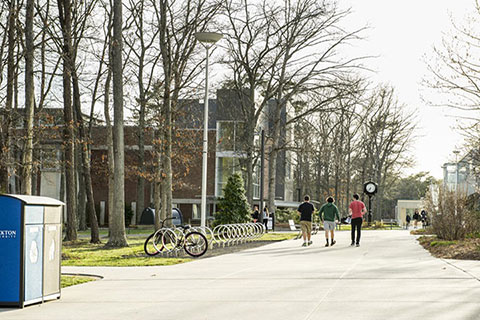Clery Act & Crime Reporting
Jeanne Clery was a college student who was raped and murdered in her dorm room at Lehigh University in 1986. The suspect, another college student, was able to access Clery’s dorm room because multiple doors had been propped open.
Jeanne Clery’s parents pressed for a law that would require institutions to report crimes so families could be informed about crimes occurring on, near and immediately adjacent to campus and be able to make sound decisions about student safety. The law, now named after their daughter (the Jeanne Clery Campus Safety Act), requires institutions to publish an annual security report which includes the three previous years of crime statistics; maintain a daily crime log, disclose certain security policies, and provide timely warnings about Clery crimes that pose an immediate or ongoing threat to students and employees.
Additional Information
A timely warning is a notification to the campus community about a Clery Act crime(s), which has occurred on Clery Act Geography, has been reported to a Campus Security Authority or local police agency and has been determined by the institution to pose a serious or continuing threat to students and/or employees.
An emergency notification is a notification to the campus community, or a segment thereof, regarding a significant emergency or dangerous situation occurring on campus, which has been confirmed by University officials and determined to pose an immediate threat to the health or safety of students and/or employees.
Examples of significant emergencies or dangerous situations include, but are not limited to:
- fire in an on-campus building
- outbreak of meningitis, norovirus or other serious illness
- approaching tornado, hurricane or other extreme weather conditions
- earthquake
- gas leak
- terrorist incident
- active shooter or armed intruder
- terrorist incident or bomb threat
- civil unrest or rioting
- chemical or hazardous waste spill
“Campus Security Authority” is a Clery-specific term that encompasses four groups of individuals and organizations associated with an institution.
A campus Police Department or a campus Security Department of an institution. All individuals who work for that department are considered to be campus security authorities.
Any individual or individuals who have responsibility for campus security but who do not constitute a campus police department or campus security department, for example, individuals who provide security at a parking kiosk, act as event security or escort students after dark.
Any individual or organization specified in an institution’s statement of campus security policy as an individual or organization to which students and employees should report criminal offenses.
An official of an institution who has significant responsibility for student and campus activities, including, but not limited to, student housing, student discipline and campus judicial proceedings. An official is defined as any person who has the authority and the duty to take action or respond to particular issues on behalf of the institution.
Clery Act crimes may be reported in the following ways:
-
by calling Stockton University Police at 609-652-4390 or 9-1-1 (if you need a police response and/or want an investigation by police),
- by using the Campus Security Authority (CSA) reporting form link (blue button, above), to make a report for inclusion in annual Clery statistics,
- by contacting the Clery Compliance Coordinator directly at rosanne.latoracca@stockton.edu or 609-652-4390 or ext. 5989 on campus, to make a report for inclusion in annual Clery statistics, or
- confidentially, by speaking with a counselor at the Women’s, Gender & Sexuality Center or Counseling & Psychological Services, to explore reporting options
Residential Life Safety
- Always keep your room door locked, even if you leave for only a few minutes.
- Never prop open doors to residence halls.
- Use the peephole before you open your room door.
- Ask for identification before you open your room door for anyone you do not know.
- Do not place a note on your door saying you are not home.
Vehicle Safety
- Study in open areas around other people. Avoid studying alone in an empty classroom.
- Try to park in a well-lit area, preferably near a staffed pay station or close to the elevator.
- When you get into your vehicle, lock the doors immediately.
- Keep car windows closed or opened only slightly while driving, so no one can reach in.
- Keep valuables, GPS units and chargers out of sight, in the console or trunk of your vehicle and lock all doors.
- When driving, know your route and be sure you have sufficient fuel.
- When traveling in your vehicle, be sure your cell phone is charged in case of an emergency.
- Do not give rides to strangers or anyone you do not know well!
Out and About Safety
- If you are a bystander and observe someone who appears to be in an unsafe situation, intervene if it is safe, or cause a distraction and call for help.
- Alcohol can impair the thought process—drink only legally and responsibly!
- Use the buddy system—walk with friends, especially at odd hours.
- Go to a party with a group of friends and be sure to leave together.
- Choose routes that are well lit and used by others. Avoid alleyways and vacant lots.
- Walk confidently and with a purpose; pay attention to your surroundings.
- Using a cell phone while walking can be distracting—put it away until you arrive at your destination.
- Wait for shuttles or other public transportation with a friend.
- If you see someone or something suspicious, get to a safe, well-lit area and call 9-1-1.
- Know the locations of blue-light emergency phone boxes on campus.
- Avoid having earbuds in both ears so you are able to hear what is going on around you.
- When a fire alarm sounds, exit your building immediately via the nearest exit.
- Pull a fire alarm on your way out if you are safely able to do so.
- Know at least two exits from you room/building in case one is blocked.
- In the event of a fire, do not stop to retrieve personal belongings.
- If there is smoke, crawl low to the floor where the air is freshest.
- If you are unable to exit your room or the building, call 9-1-1 and advise of your location; yell out the window when help arrives.
- When cooking, stay in the kitchen to keep an eye on your food.
- Cooking after you have consumed excessive amounts of alcohol increases the chance of a fire.
- Do not pour water on a grease fire—it may cause the grease to splatter and burn you.
- If food in the microwave is on fire, leave the door closed and call 9-1-1.
- Clean the dryer lint trap before and after each use.
- Never cover smoke detectors.
- Keep clothing and other fabrics away from heaters and lamps.
- Be sure to turn off and unplug appliances.






